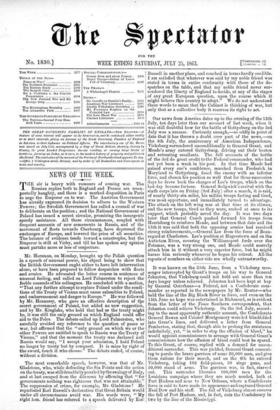Our news from America dates up to the evening of
the 13th July, ten days later than our account of last week, when it was still doubtful how far the battle of Gettysburg on the 3rd July was a success. Curiously enough,—so oddly in point of date that it has thrown a doubt over part of the news,—on the 4th July, the anniversary of American Independence, Vicksburg surrendered unconditionally to General Grant, and Meade's army entered Gettysburg, driving out their beaten and retreating assailants. The full accounts of the battle of the 3rd do great credit to the Federal commander, who had not yet been a week in his post. In that time Meade had gained every one's confidence, marched from Frederick in Maryland to Gettysburg, faced the enemy with an inferior force, and chosen his position so well that for three successive days he drove back the charges of Lee's troops, which on the last day became furious. General Sedgwick's arrival with the sixth corps late on Friday (3rd July) after a march, it is said, of nearly thirty-six miles, his militia troops fasting and tired, was most opportune, and immediately turned to advantage. The attack on the left wing was at that time at its climax, and the new troops, tired as they were, rushed at once to its support, which probably saved the day. It was two days later that General Couch pushed forward his troops from Harrisburg to reinforce Meade, and between that date and the 13th it was said that both the opposing armies had received strong reinforcements,—General Lee from the force of Beau- regard at Charleston. Lee's position at Hagerstown and on the Antietam River, covering the Williamsport fords over the Potomac, was a very strong one, and Meade could scarcely attack him in it without a very superior force, but he might harass him seriously whenever he began his retreat. All the reports of numbers on either side are wholly untrustworthy.






























